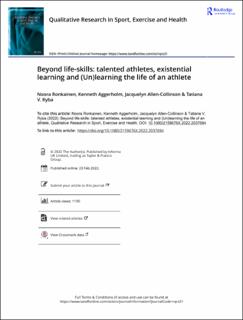| dc.contributor.author | Ronkainen, Noora | |
| dc.contributor.author | Aggerholm, Kenneth | |
| dc.contributor.author | Allen-Collinson, Jacquelyn | |
| dc.contributor.author | Ryba, Tatiana V. | |
| dc.date.accessioned | 2022-07-01T08:37:51Z | |
| dc.date.available | 2022-07-01T08:37:51Z | |
| dc.date.created | 2022-03-03T14:27:10Z | |
| dc.date.issued | 2022 | |
| dc.identifier.citation | Qualitative Research in Sport, Exercise and Health. 2022, Artikkel 2037694. | en_US |
| dc.identifier.issn | 2159-676X | |
| dc.identifier.uri | https://hdl.handle.net/11250/3002007 | |
| dc.description | This is an Open Access article distributed under the terms of the Creative Commons Attribution-NonCommercial-NoDerivatives License (http://creativecommons.org/licenses/by-nc-nd/4.0/), which permits non-commercial re-use, distribution, and reproduction in any medium, provided the original work is properly cited, and is not altered, transformed, or built upon in any way. | en_US |
| dc.description.abstract | Following developments in educational discourse more broadly, learning discourses in youth sport have been shaped by outcome-based and instrumental goals of developing useful life-skills for ‘successful’ lives. There is, however, a need to expand such traditional understandings of sport-based youth development, which we undertook by exploring existential learning in sport through encountering discontinuity. We conducted in-depth qualitative research with 16 Finnish athletes (seven men/nine women, aged 19–20), five of whom had recently disengaged from the athlete development pathway. In the interviews, we used creative non-fiction vignettes to invite reflections on learning experiences in sport. Although participants reported having learnt many useful skills commonly associated with positive youth development discourses (e.g. goal setting, time-management), many also provided rich descriptions of other, important ‘life lessons’. These involved developing awareness of their bodily limitations, the nature of social relationships, and what it was like to live the life of an elite athlete. The findings revealed problematic features of (elite) sport cultures but also showed that encountering discontinuity could be beneficial as an important trigger for existential reflection, clarification of values, and a search for alternative ways of living. | en_US |
| dc.language.iso | eng | en_US |
| dc.subject | critical moments | en_US |
| dc.subject | informal learning | en_US |
| dc.subject | meaning in sport | en_US |
| dc.subject | positive youth development | en_US |
| dc.title | Beyond life-skills: Talented athletes, existential learning and (un)learning the life of an athlete | en_US |
| dc.type | Peer reviewed | en_US |
| dc.type | Journal article | en_US |
| dc.description.version | publishedVersion | en_US |
| dc.rights.holder | © 2022 The Author(s) | en_US |
| dc.source.pagenumber | 15 | en_US |
| dc.source.journal | Qualitative Research in Sport, Exercise and Health | en_US |
| dc.identifier.doi | 10.1080/2159676X.2022.2037694 | |
| dc.identifier.cristin | 2007402 | |
| dc.description.localcode | Institutt for lærerutdanning og friluftslivsstudier / Department of Teacher Education and Outdoor Studies | en_US |
| dc.source.articlenumber | 2037694 | en_US |
| cristin.ispublished | true | |
| cristin.fulltext | original | |
| cristin.qualitycode | 1 | |
